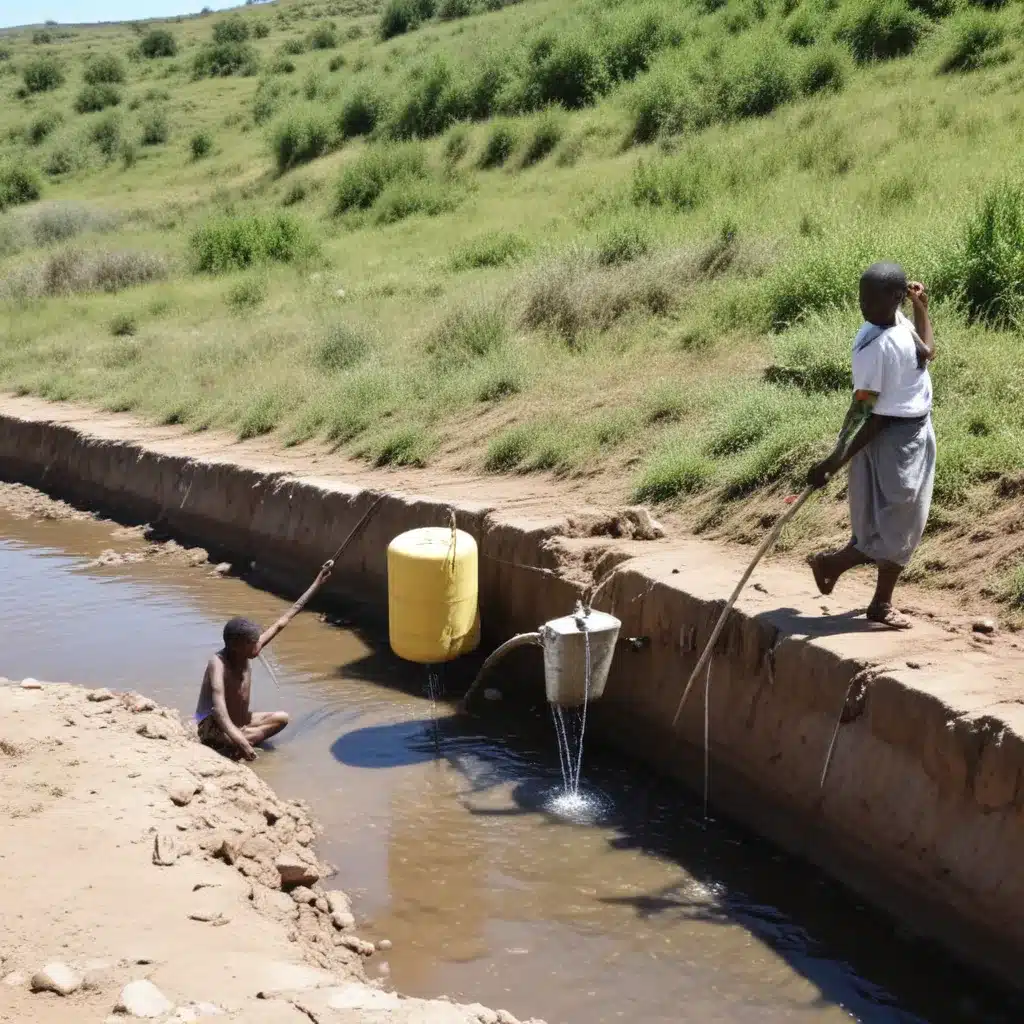
Resilient Communities Taking Water Matters into Their Own Hands
In the remote villages of the Eastern Cape, where government support has fallen short, determined residents are taking drastic measures to secure their access to clean water. Faced with years of relying on contaminated water sources shared with livestock, these resilient communities have banded together to fund and construct their own water supply systems.
The residents of Zigadini location near KwaBhaca (formerly Mount Frere) are a prime example of this grassroots initiative. Tired of drinking water from sources where pigs swim, they have pooled their meager resources to install a reliable water infrastructure. This remarkable feat of community-driven problem-solving stands in stark contrast to the apparent failures of their local municipality to address the water crisis.
Pooling Resources, Securing a Water Future
Each household in Zigadini is contributing a staggering R1,000 towards the infrastructure costs and an additional R750 for labor – a significant financial burden, especially for the many pensioners and social grant recipients in the village. Despite the hefty price tag, the residents have come together with a steely determination to secure their access to clean water.
“It’s a lot of money, but we’re tired of drinking water from where pigs swim. We want clean water,” affirms Nonkazimlo Nqalathi, a resident leading the community’s efforts.
So far, the villagers have managed to purchase two 5,000-litre tanks and lay the necessary pipes, connecting 14 households to their own water supply system. This self-funded initiative highlights the resilience and resourcefulness of these Eastern Cape communities, who refuse to be held hostage by the failures of their local government.
Persistent Municipal Shortcomings
The Zigadini location falls under the jurisdiction of the Umzimvubu Local Municipality, but the responsibility for water supply rests with the Alfred Nzo District Municipality. This administrative tangle has only compounded the community’s water woes.
In 2019, the district municipality installed a borehole, but it never worked. In 2022, they returned and installed water infrastructure in the neighboring Machibini area, but other communities like Moyeni, Mampondomiseni, and the rest of Zigadini were left high and dry.
“We are hoping that the municipality will meet us halfway, but we can’t wait any longer,” laments Nqalathi, underscoring the community’s exasperation with the lack of reliable government support.
Ward 24 Councillor Mlungiseleli Jonase (ANC) acknowledges the issue, stating that there is currently no budget allocated for the community’s self-funded water project. This lack of financial backing from the local authorities has forced the residents to shoulder the entire burden themselves.
Municipalities Warned about Underspending
While the residents of Zigadini invest their hard-earned money into securing their water future, the Alfred Nzo District Municipality has faced scrutiny over its apparent mismanagement of infrastructure grants.
In correspondence seen by GroundUp, the Department of Cooperative Governance and Traditional Affairs (COGTA) warned the municipality in September that it would withhold further grant payments due to persistent underspending. Of the R123-million in grants, the municipality had spent only R16-million (13%), according to COGTA.
However, the municipality disputed these allegations, claiming that its expenditure would, in fact, reach 66% once all invoices were received. The municipality requested that the funds not be withheld, and COGTA subsequently confirmed that a second tranche of infrastructure grant money was transferred in October.
Zithobile Mvinjana, a resident of the nearby Mampondomiseni village, expressed frustration with the municipality’s apparent failings. “Since the municipality is failing us, it must just supply taps and pipes, so people can continue on their own,” she asserted.
A Beacon of Hope in the Eastern Cape
The self-funded water project in Zigadini location stands as a beacon of hope in the face of ongoing municipal shortcomings. These resilient villagers, driven by a fundamental need for clean water, have demonstrated the power of community-led solutions.
Their perseverance and resourcefulness in the face of adversity offer valuable lessons for other marginalized communities struggling with water access. By pooling their limited resources and taking matters into their own hands, the residents of Zigadini have not only secured a reliable water supply but have also set an inspiring example of grassroots problem-solving.
As the local authorities grapple with allegations of underspending and inefficiency, these Eastern Cape communities have shown that when governments fail to fulfill their responsibilities, the people can rise to the occasion and create their own pathways to a sustainable water future.
The story of Zigadini is a testament to the resilience and determination of rural South Africans, reminding us that even in the face of daunting challenges, community-driven solutions can pave the way for lasting change. It is a call to action for municipalities and policymakers to prioritize the needs of marginalized communities and empower them to be active partners in the quest for universal access to clean water and sanitation.
Conclusion
The residents of Zigadini location have demonstrated that when governments fall short, communities can rise to the occasion. By pooling their limited resources and taking matters into their own hands, they have secured a reliable water supply and set an inspiring example of grassroots problem-solving.
Their story is a testament to the resilience and determination of rural South Africans, and a call to action for municipalities and policymakers to prioritize the needs of marginalized communities. As the Eastern Cape villagers continue their self-funded water project, their success can serve as a blueprint for other communities struggling with water access, empowering them to create their own pathways to a sustainable water future.
Through community-driven initiatives like the one in Zigadini, we can envision a future where every South African has access to clean water and sanitation – a future built on the strength and resourcefulness of the people themselves. The story of these Eastern Cape villagers is a reminder that when governments fail to fulfill their responsibilities, the people can rise to the occasion and create lasting change.

